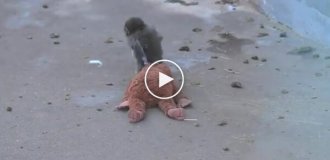The Russian Federation's losses in Syria are colossal. This Russia doesn’t know how to fight at all,” Arestovich

The Russian command in Syria lost Palmyra, which they took some time ago with pomp, heavy losses and a Raldugin concert.
The regular Russian troops left Palmyra for themselves and even abandoned their weapons and military equipment there. Now these are the trophies of ISIS. There are 30 tanks alone. Palmyra was taken by a reinforced battalion of light infantry in jeeps.
The image losses of the Russian Federation are colossal, and in addition to this, the loss of Palmyra problematized the capture of Aleppo, because now it is necessary to divert already limited resources.
This happens because the Russians do not know how to fight. To hide this simple fact, the Kremlin is spending billions of dollars and the enormous efforts of its propaganda machine.
The main argument that is usually given is:
- a country that occupies 1/7 of the landmass and knows how to fight.
However, simple arguments destroy this artificial mythology:
1. Let's evaluate the quality of this sushi. Maybe no one just needs her?
2. Who conquered this land for Russia?
3. How is this land administered and exploited, how is surplus value created on it?
4. The land was conquered, the seas were lost. Meanwhile, world trade is maritime trade.
Now Russia is fighting on land in Syria, for an unfortunate naval base, dropping fighter jets into the sea, and, characteristically, continues to lose on land.
Why doesn't Russia know how to fight?..
Any sociosystem (country) fights the better, the more stable and productive society it has built and maintains.
Combat readiness and the ability to win are a complex characteristic not of the army and the state, but of the entire sociosystem, including society, its traditions and fairy tales.
Russia is a sociosystem with a very imperfect structure of society and primitive, low-added-value methods of management.
Actually, the way of managing and the level of organization of society is characterized as “barbaric”:
– barbaric exploitation of personnel and resources.
The victories that make up the pantheon of glory of “Russian weapons” belong to the periods (roughly) when the Germans were in charge, and the Ukrainians and other peoples of the empire fought alongside the Russians.
In the modern period, Russia without Ukraine and Belarus has not won a single war.
“Stalin’s Victory” is practically the same situation:
– the general leadership is organized by a foreigner, the effectiveness is ensured by the barbaric exploitation of people and resources, which gives an intermediate victory, but leads to a strategic and historical loss.
Stalin himself, as you know, did not celebrate Victory Day.
Fresh wars of Russia in the version of the Russian Federation: Caucasian, Georgian, Ukrainian, Syrian - the diseases are still the same, organic:
– primitive planning (imperfection of specialized personnel and institutions),
– the overwhelming (without expressed feedback) primacy of media and political tasks over the military (the “Russia” sociosystem cannot ensure the proper and proper balance in the top military-political leadership),
– low level of development of energy and technology (the “Russia” sociosystem cannot ensure the production and operation of complex technical and human-technical systems),
– barbaric methods and methods of war in relation to one’s own, others’, and random ones (the “Russia” sociosystem projects its own primitiveness onto theaters of military operations).
What s/s “Russia” does well is strong-willed efforts to forcefully push through its own plans.
Those. she successfully drives her own people to machine guns, and, with the concentration of resources appropriate to the task, “takes cities.”
However, such a concentration of efforts occurs through an even greater barbarization of relations inside and outside the sociosystem and, ultimately, leads to a strategic and historical loss.
Let's call this dilemma “Stalin's problem.”
A typical and fresh example from the Russian-Ukrainian conflict is the capture of Debaltseve.
They pushed through the capture at the cost of heavy losses, which ultimately led to the abandonment of further development of the offensive and the loss of the very ability to attack in these conditions.
After Debaltsevo, there were no more operational offensives. The political situation is even more at a dead end - sanctions have not been lifted, the possibility of promoting Russian interests in Ukraine through military means has been lost. More or less competent resistance in creating the required amount of appropriate resources neutralizes this – the only essentially Russian advantage. The overall rating ranges from “two plus” to “three minus”. Don't believe, don't be afraid, don't ask, don't agree. Not only do they not know how, they never knew how.
Muscovites are not only not scary, they are funny in their attempts,” writes Alexey Arestovich on Obozrevatel.





















